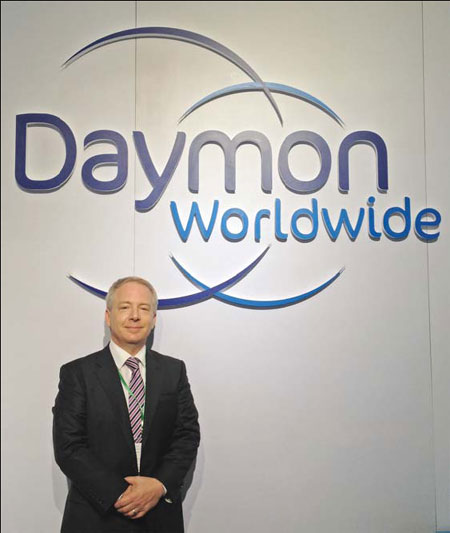Local ventures seek more partnerships
Updated: 2013-01-11 09:43
By Yao Jing (China Daily)
|
|||||||||||
|
Steve DelGiorno, vice-president of Daymon Worldwide, says private label sales could account for 20 percent of the Chinese retailing business in less than 10 years. Yao Jing / China Daily |
Daymon finds its niche in linking retailers, suppliers
Li Daomo, the food development manager of China Heli Mart, from Southeast China's Guizhou province, has been assigned to Shanghai to find development opportunities for the retailer's private label products.
China Heli Mart, which has 50 chain stores in western China, is among those less famous local retailers that are wooing private labels to compete with global retailers.
After a short talk with Steve DelGiorno, vice-president of the United States-based consultant company Daymon Worldwide, Li says he will bring back the information and ask his top manager to prepare for DelGiorno's arrival.
Daymon Worldwide, the 42-year-old full-service retail branding and sourcing company, was one of the first consultants to focus on linking retailers and suppliers. This means it is well placed to participate in the developing Chinese private label market.
"China is so amazing that most of us outside the provinces do not know of the existence of these local retailers. They want private labels, but they do not know where to begin," DelGiorno, 48, says.
Daymon established a branch in Shanghai eight years ago after venturing into Japan and South Korea. Of its 8,000 suppliers worldwide, it now has about 500 manufacturers for Chinese retailers. Its Chinese business is growing at an annual rate of 10 percent.
The company's clients include Shanghai-based retail giant Lianhua Supermarket Holdings Co Ltd, boutique store Beijing Hualian Market Place and 10 other retailers in China, as well as Korean hypermarket Lotte Mart and Japan's biggest supermarket operator, Aeon.
"We worked with Lianhua Supermarket Holdings for three years, and then signed a short contract with Lotus. But what we are looking for in China is a long-term strategic retailer relationship, as some of our partnerships in the US last for 20 or 30 years," DelGiorno says.
The private label business is relatively new in Asia, compared with the likes of the US and Europe, where it has existed for many decades. But DelGiorno is optimistic about the market in China.
"Private label sales are 2 percent of the Chinese retail business, but we see that it could be easily 20 percent in less than 10 years," he says, explaining that it was initially a struggle for him to educate the local market. Private labels simply did not exist when he first came here.
The first and most important job, DelGiorno says, is to educate retailers and manufacturers about the future and its benefits of private label.
"A lot of Chinese manufactures want to build their own brands, not a retail brand, but there are so many specialized private label companies in the US," he says.
Private labels present a chance for producers to create a partnership with retailers. As a lower-cost way to sell products to a retailer, it can also help suppliers sell products internationally, and a retailer can be helpful if the supplier also has its own brand. It also makes the producer more efficient, because its production line will be much busier.
"It is difficult for domestic manufacturers to meet the global quality standards in competing with overseas suppliers, and this is the reason why they are focusing on branded products," DelGiorno says.
The consulting company has been cautious when it comes to finding suppliers in China. Before making a deal, Daymon representatives visit the factory once or twice, then test the products in the factory and in shipments. After that, products on shelves are randomly tested to make sure they are of the same quality.
For local retailers, confronted with the rise of giant, global competitors, they can create differentiation in their stores and then build loyalty with customers.
"If a customer goes in and loves the product, they can only buy it from you. Further, a retailer can get a higher profit margin, 5 to 12 percent higher compared with branded products, depending on the category," DelGiorno says.
Consumers also need to be educated about private labels, which he describes as being cheaper in price but of good quality. As in the US, when the economy slows down, consumers always look for more value when they purchase products.
"Private labels are a good alternative. But the quality has to be there, otherwise the retailer will fail in the competition," DelGiorno says.
The 20-year Daymon man says he will never push Western thinking into a Chinese customer's mind, and he pays close attention to the local market.
His first China trip was to Guangzhou in 2004 to check out the retail industry. He found that private labels did not exist in China and some domestic brands were not as good as private label products overseas.
"If we can develop private labels to a higher standard, we will succeed in China," he says.
DelGiorno now lives in South Korea, but he comes to China once a month to see retailers and suppliers.
yaojing@chinadaily.com.cn
(China Daily 01/11/2013 page13)
Today's Top News
Police continue manhunt for 2nd bombing suspect
H7N9 flu transmission studied
8% growth predicted for Q2
Nuke reactor gets foreign contract
First couple on Time's list of most influential
'Green' awareness levels drop in Beijing
Palace Museum spruces up
Trading channels 'need to broaden'
Hot Topics
Lunar probe , China growth forecasts, Emission rules get tougher, China seen through 'colored lens', International board,
Editor's Picks

|

|

|

|

|

|






